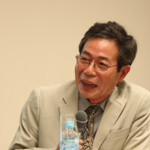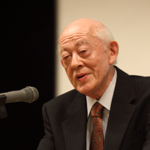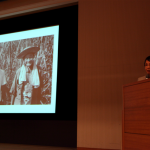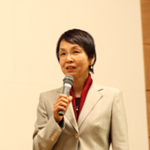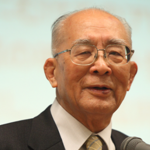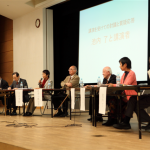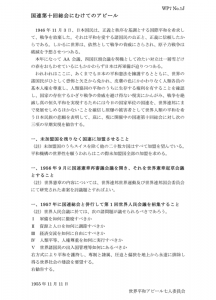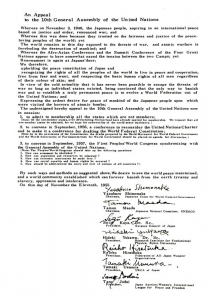作成者別アーカイブ: wp7e
2023 157E contaminated water should not be released into the ocean
April 6, 2023
Committee of Seven to Appeal for World Peace
(founded in 1955)
Yoshino Oishi, Michiji Konuma, Satoru Ikeuchi, Shin’ichiro Ikebe, Kaoru Takamura, Susumu Shimazono, Keiko Sakai
Due to the reactor core collapse accident in 2011 at the Tokyo Electric Power Company, Holdings, Inc. (TEPCO)’s Fukushima Daiichi Nuclear Power Station (from now on referred to as “the nuclear power plant”) the nuclear fuel was melted down. In addition to the cooling water that must be constantly supplied now and for a long time, large amounts of groundwater and rainwater continue to flow into the reactor buildings. As a result, contaminated water containing a tremendous amount of radioactivity generate constantly from the site of the nuclear power plant, and to date, approximately 1.3 million tons of water has been collected in more than 1,000 tanks.
TEPCO complained that the limit would come shortly to how much could be stored on the site, and in response, the Japanese government officially decided on January 13, 2023, that it plans to start releasing it into the ocean 1km offshore through an undersea tunnel in the coming spring or summer. However, in 2015, the government and TEPCO promised in writing that they would not dispose of contaminated water without the understanding of the concerned parties. The government’s decision In the last January is inconsistent with this promise, since the understanding among the fishermen and other concerned parties does not yet reach. Despite such circumstances, the construction of facilities for ocean discharge is currently proceeding at a rapid pace. This plan has various scientific and social problems, and it is feared that it will harm international politics.
From the scientific point of view, 62 types of radioactive substances, such as cesium and strontium, are supposed to be removed until they fall below the regulation value by the Advanced Liquid Processing System (ALPS). This means that some amount of these substances remain in the processed water, and tritium cannot be removed even though it is a radioactive element since tritium and ordinary hydrogen have the same chemical property. Therefore, it says that the water containing tritium is diluted with seawater and dumped into the ocean. It is also noted that tritium releases into the environment during regular operation of nuclear power plants, and the radioactivity (beta rays) emitted from tritium has low energy, so it is safe even if it is released into the environment. Further, a very small amount of tritium is daily produced in the air and it exists in nature. it is said that there is no problem even if you come in contact with it. However, the treated water that touched the exposed nuclear fuel of the accident reactor and the wastewater during regular operation cannot be considered in the same way. And since the beta rays from tritium that enter the body with water have more energy than they can damage DNA, they can cause internal radiation damage. There is also an epidemiological study showing that the incidence of leukemia in children is high in areas near nuclear power plant. In short, there is no scientific consensus on low-dose radiation exposure, not just tritium. This shows the limitations of current science that cannot give a clear answer.
Our course of action in such cases is to base our immediate actions on non-scientific principles of judgment. What we want to advocate here is the “safety first principle (precautionary principle)”. This is the principle that if the danger of a problem that arises cannot deny, the priority is to take safety measures. In light of this principle, it points out that tritium is dangerous, so tritium should not be released into the environment easily.
Furthermore, the release of contaminated water into the ocean is not only likely to have a long-lasting impact on a wide range of fishermen including those in Fukushima Prefecture who have maintained their hopes for full-scale fishing, but it also poses a problem of international trust. Neighboring countries, including South Korea and China, have already expressed their opposition. Pollution of the sea does not stay localized but spreads widely and may adversely affect fishing grounds. Pacific Islanders demand not to release until all stakeholders confirm it is safe.
As mentioned above, the plan to release contaminated water into the ocean, which poses various scientific, social, and international problems, must not be pushed forward. Tritium has a half-life of 12.32 years, so if one continues to store it, the radioactivity of the tank will decrease over time. If necessary, secure more space. In the meantime, it should be considered to reduce the amount of contaminated water generated as much as possible while further strengthening research and development such as solidification. There is no other choice but to avoid haste and take time to deal with radioactivity.
PDF Appeal→![]() 157e.pdf
157e.pdf
Publish appeal “We urge all nuclear weapon states to immediately commit to no first use of nuclear weapons”
2022 155E We urge all nuclear weapon states to immediately commit to no first use of nuclear weapons
October 11, 2022
Committee of Seven to Appeal for World Peace
(founded in 1955)
Yoshino Oishi, Michiji Konuma, Satoru Ikeuchi, Shin’ichiro Ikebe, Kaoru Takamura, Susumu Shimazono
The world today is at a critical crossroads between the danger to lead from devastation and escalating conflicts to human extinction and the possibility of resolving conflicts and living in peace and security.
Izumi Nakamitsu, the United Nations High Representative for Disarmament Affairs (Under-Secretary-General) told in her speech on October 3, 2022, at the beginning of the first day of the general debate of this term (the 77th session) of the First Committee (Disarmament and International Security) of the United Nations General Assembly that “the existential dangers posed by nuclear weapons were back in the global spotlight”, appealed to all states in possession of nuclear weapons “to commit to no first use of any nuclear weapon” as an immediate measure to help save humanity from potential extinction and called for an end to the “devastating and senseless war” in Ukraine.
Earlier, at the Peace Memorial Ceremony held in Hiroshima on August 6, 2022 António Guterres, the UN Secretary-General, also appealed, “Countries with nuclear weapons must commit to the “no first use” of those weapons.”
We, the Committee of Seven to Appeal for World Peace, support the appeal of Secretary-General Guterres and Representative Nakamitsu for no first use commitment to nuclear weapons. We urge the leaders of the United States of America, the Russian Federation, the United Kingdom of Great Britain and Northern Ireland, the French Republic, the State of Israel, the Republic of India, the Islamic Republic of Pakistan and the Democratic People’s Republic of Korea to immediately commit to no first use of nuclear weapons.
We appreciate that the People’s Republic of China is the only country that has declared no first use of nuclear weapons among the nuclear weapon states, and we request sincerely their concrete leadership for reduction of the role of nuclear weapons, their abolition, and the easing of tensions and friendship with neighboring countries.
Furthermore, we are unacceptable that the Japanese government has persisted in relying on the extended deterrence by nuclear weapons, contrary to the desire of the majority of the Japanese people to abolish nuclear weapons, and that it has strongly opposed the possible adoption of the United States’ policy of no first use of nuclear weapons. A country with a policy that does not deny dependence on nuclear weapons or preemptive strikes on “enemy countries” may become the target of nuclear or preemptive strikes from other countries. This waives the government’s responsibility to protect its citizens and increases the risk of putting them at risk. We urge the Japanese government to make a drastic change from a security policy centered on expanding armaments to a policy of strengthening diplomatic efforts.
PDF Appeal→![]() 155e.pdf
155e.pdf
Publish appeal “We urge the immediate stop of the invasion of Ukraine by Russia”
2022 151E We urge the immediate stop of the invasion of Ukraine by Russia
February 2, 2022
Committee of Seven to Appeal for World Peace
(founded in 1955)
Yoshino Oishi, Michiji Konuma, Satoru Ikeuchi, Shin’ichiro Ikebe, Kaoru Takamura, Susumu Shimazono
We urge the immediate stop of the military invasion of Ukraine by Russia and the complete withdrawal from the territory of Ukraine. Any difference of standpoint and viewpoint between Ukraine and Russia must not be solved by military powers but by peaceful talk among concerned parties respecting diversity and human right.
We strengthen solidarity with citizens opposing invasion, in the world including in Russia.
PDF Appeal→![]() 151e.pdf
151e.pdf
Publish appeal “The Tokyo Olympic and Paralympic Games should not be held in summer 2021.”
2021 146E The Tokyo Olympic and Paralympic Games should not be held in summer 2021.
May 5, 2021
Committee of Seven to Appeal for World Peace
(founded in 1955)
Yoshino Oishi, Michiji Konuma, Satoru Ikeuchi, Shin’ichiro Ikebe, Kaoru Takamura, Susumu Shimazono
The opening ceremony of the Tokyo Olympics is scheduled within 80 days on. The selection of athletes is approached in the final stages. The Olympic torch relay started. However, on some games and matches the normal selection processes could not be taken but the athletes had to be chosen by past records. Some parts of the torch relay are cancelled in public road and are held in empty venues.
These are due to rapid expansion of pandemic of COVID-19 and its variants. The Japanese Government is issuing the Declaration for State of Emergency and the Intensive Measures Preventing the Spread of Virus successively. But these actions are failing to put an end to ever spreading the infection. Even experts commissioned by the government regard the present situation as the arrival of the fourth wave of the infection. This is much larger than the past three waves of infection. On the other hand, the Government repeats slow actions making light of scientific judgment and neglecting their advices. The vaccination against the present virus is terribly behind schedule. The commitment to treat variants is too slow. The PCR tests are still limited in Japan.
In Japan the medical care system is collapsing by severe shortage of manpower and beds for patients in serious condition in spite of tireless efforts of medical personnel. More cases of COVID-19 have been reported globally in recent weeks than past.
Fifteen thousand Olympic and Paralympic athletes will come into Japan. Tens of thousands of judges, officials, media and broadcasters will also enter Japan. Many of them will come from infected areas to severely infected Japan. Very many volunteers will be mobilized in Japan. Many medical beds, medical personnel and medical instruments and materials are necessary but Japan can’t afford to share them to the Olympics and Paralympics since even now the collapse of medical system is expanding in many areas in Japan. Spectators from abroad during the Olympics and the Paralympics have already been refused. Domestic fans are told to be cut out from any direct contacts with Olympians. They will also be possible to be refused from the venues. Concrete plans are not publicly shown for safe and secure Olympics and Paralympics.
The Olympic Charter says that, in Fundamental Principles of Olympism, 2. The goal of Olympism is to place sport at the service of the harmonious development of humankind, with a view to promoting a peaceful society concerned with the preservation of human dignity.
Many possible risks are not denied. In this situation we should stand at the safe side. The non-holding of the Olympics and the Paralympics in summer 2021 should be decided as soon as possible.
The Japanese version of this appeal was issued on April 20, 2021.
PDF Appeal→![]() 146e.pdf
146e.pdf
2020 145E We oppose the military coup in Myanmar and urge the restoration and advancement of democratization
February 8, 9(Rev.), 2021
Committee of Seven to Appeal for World Peace
Kinhide Mushakoji, Yoshino Oishi, Michiji Konuma, Satoru Ikeuchi, Shin’ichiro Ikebe, Kaoru Takamura, Susumu Shimazono
The military in Myanmar detained in the morning of February 1 the State Counsellor Daw Aung San Suu Kyi, President U Win Myint and other National League for Democracy (NLD) officials across the country and declared the assumption of power. It was the day of the first parliamentary sessions after the great victory of the NLD which was founded by Aung San Suu Kyi and others in 1988 and the serious defeat of the Union Solidarity and Development Party (USDP) linked to the military in the general election in November 2020.
The election was held in a peaceful manner. According to the statement issued on the next day of the election by the Japanese Ministry of Foreign Affairs, the election was watched by many domestic and foreign election observer missions of more than 12,000 members in total including a team of 19 members dispatched by the Government of Japan and the election activities, voting and the vote counting were concluded as transparent and generally fair.
Nevertheless, the military and the USDP called for the investigation to clarify voting irregularities repeatedly and the Union Election Commission rejected the claim.
We never acknowledge the detention of the State Counsellor, President and others by the military who did not accept the result of the general election, denied the freedom of communication and strengthened its regulation.
1 The military in Myanmar should release all in custody in the present action immediately and unconditionally.
2. The military in Myanmar should remove all regulation of communication and guaranty the freedom of communication.
3. The Japanese Government should demand the military in Myanmar to respect the result of the election and to restore the situation, and make the utmost effort for advancement of its democratization.
4. Japanese companies which have supported military-linked counter parts in Myanmar should change the partners to contribute toward the advancement of democratization.
“After the election the military and the USDP called for the investigation to clarify voting irregularities but the Union Election Commission rejected the claim. It is reported that a foreign election observation team evaluated the election generally fair.”
Is replaced by
“The election was held in a peaceful manner. According to the statement issued on the next day of the election by the Japanese Ministry of Foreign Affairs, the election was watched by many domestic and foreign election observer missions of more than 12,000 members in total including a team of 19 members dispatched by the Government of Japan and the election activities, voting and the vote counting were concluded as transparent and generally fair.
Nevertheless, the military and the USDP called for the investigation to clarify voting irregularities repeatedly and the Union Election Commission rejected the claim.”
PDF Appeal→![]() 145e.pdf
145e.pdf

